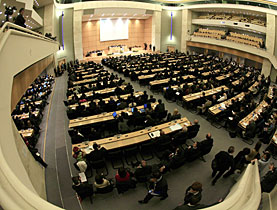
UN summit approves anti-racism declaration

More than 100 countries at a controversial United Nations racism conference in Geneva have agreed on a declaration urging the world to combat intolerance.
The 143-point document, a broad call to fight racism and discrimination against minorities, was adopted by consensus and without debate at a public session, three days before the end of the weeklong meeting.
It also warns against stereotyping people because of their religion, a key demand of Islamic states who say Muslims have been unfairly targeted for their beliefs since the 9-11 terrorist attacks in the United States.
The declaration reaffirms principles agreed at the UN’s first global racism meeting eight years ago in Durban, South Africa, when the United States and Israel walked out because many participants had taken the Jewish state to task over its treatment of Palestinians.
In a speech on Tuesday afternoon Swiss Foreign Minister Micheline Calmy-Rey said she was “very satisfied” with the outcome and thanked all the delegates “for their flexibility and cooperative spirit”.
“We are encouraged and happy that a text has been adopted. It will enable us to make progress against all forms of racism. It is a success,” she said.
“After the unacceptable comments yesterday, it is a very important signal for the victims of racism.”
“Empty-chair policy”
On Monday, dozens of delegates left the forum after Iranian President Mahmoud Ahmadinejad said Israel had been founded “on the pretext of Jewish sufferings and the abuse of the question of the Holocaust”.
He also referred to Israel as a “totally racist government”, remarks that UN officials decried as “unsavoury” and “unacceptable”.
A text of his remarks circulated by Iran’s Geneva mission had him referring to the “ambiguous and dubious question of the Holocaust”, but Ahmadinejad did not use those words.
The Swiss ambassador to the UN in Geneva, Dante Martinelli, remained in the conference room. The foreign ministry said Ahmadinejad had the right to freedom of speech.
Calmy-Rey also defended Martinelli, saying “an empty-chair policy is not the policy of Switzerland”.
Italy and Germany were among several countries that joined the United States in boycotting the conference.
“Bruising episode”
UN officials hope the early endorsement of the text, which was negotiated over months in preparatory talks in Geneva, will return the focus of the conference to issues such as links between poverty and discrimination and ways to prevent xenophobic attacks on foreign workers.
French Foreign Minister Bernard Kouchner said earlier on Tuesday that approving the text would represent “a defeat for Ahmadinejad”, whose remarks a UN human rights investigator said were delivered with an intent of “total confrontation”.
“It is not a question of different views. It is a question of the animosity in those views,” said Asma Jahangir, special rapporteur on freedom of religion or belief.
UN human rights spokesman Rupert Colville said the conference had moved on from the drama that surrounded Ahmadinejad’s appearance on Monday, during which some activists accredited for the forum staged noisy protests.
“It was a very bruising episode yesterday, clearly, but we have to get back to the issues,” he said before the declaration was adopted in the Palais des Nations assembly hall.
Boycott?
US President Barack Obama said on Tuesday he wanted direct diplomacy with Iran but without taking other options off the table.
The US walked out of the previous major UN race summit in Durban in 2001 after Arab states sought to define Zionism as racist.
Washington had largely sat out negotiations over that text in preparatory meetings in Geneva. Although the European Union did take part, and endorsed the draft as “conference-ready” last week, several EU states said over the weekend they would also boycott the meeting, along with Australia and New Zealand.
Most of the delegates who walked out during Ahmadinejad’s remarks on Monday rejoined the conference after he finished speaking.
Several delegates and human rights groups expressed regret that some countries were boycotting the meeting instead of arguing their position on racism, while Jewish groups praised those who walked out or stayed away.
UN Secretary-General Ban Ki-moon said in Malta on Tuesday: “It is very regretful that the conference was misused by the Iranian president for political purposes. Before the speech I had a long bilateral meeting with President Ahmadinejad and urged him to give a balanced and constructive contribution to the conference because he was the only head of state present.”
Ban also expressed regret that some countries had stayed away from the conference.
The conference, dubbed Durban II, continues until Friday.
swissinfo with agencies
The United Nations Durban Review Conference takes place in Geneva from April 20-24. It will evaluate progress towards the goals set by the World Conference against Racism, Racial Discrimination, Xenophobia and Related Intolerance in Durban, South Africa, in 2001.
After a wide-ranging debate, the conference adopted by consensus an action plan to provide a new framework for guiding governments, non-governmental organisations and other institutions in their efforts to combat racism, racial discrimination, xenophobia and related intolerance.
Among its measures for combating racism are strengthening education, fighting poverty, improving resources available to victims of racism, and bolstering respect for the rule of law and for human rights. Critics say little of this has happened since 2001.

In compliance with the JTI standards
More: SWI swissinfo.ch certified by the Journalism Trust Initiative






























You can find an overview of ongoing debates with our journalists here . Please join us!
If you want to start a conversation about a topic raised in this article or want to report factual errors, email us at english@swissinfo.ch.